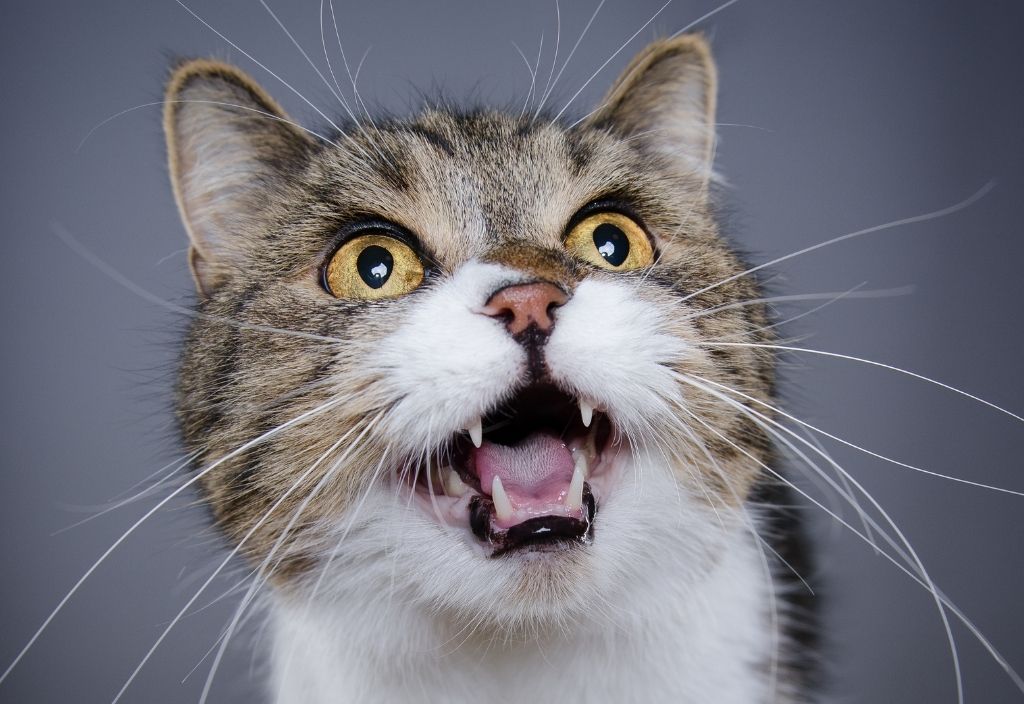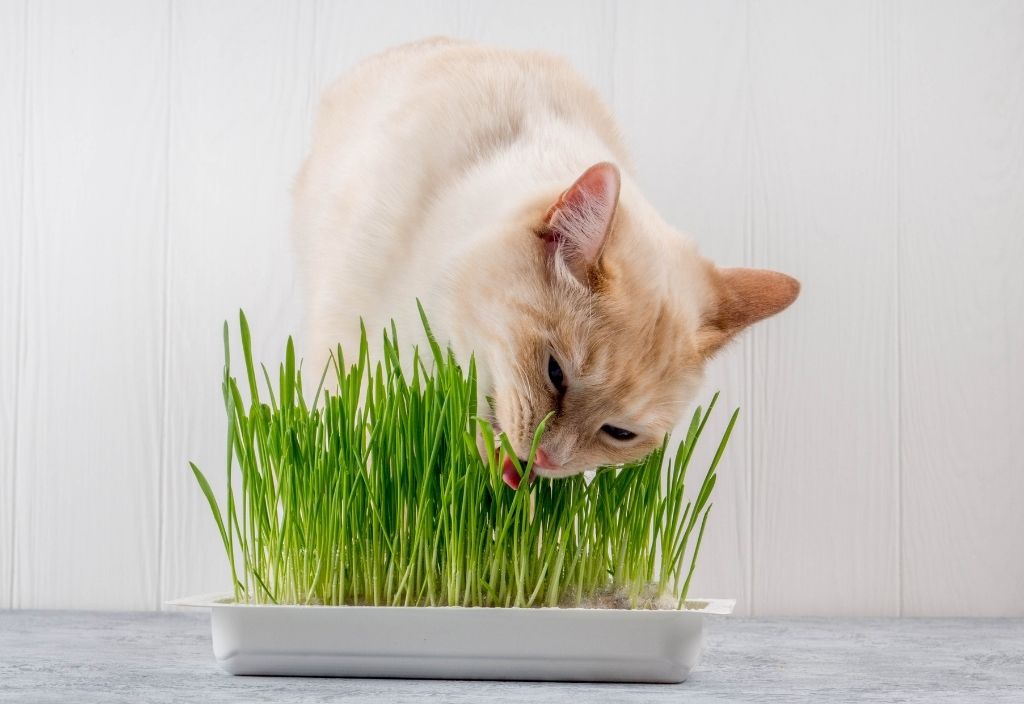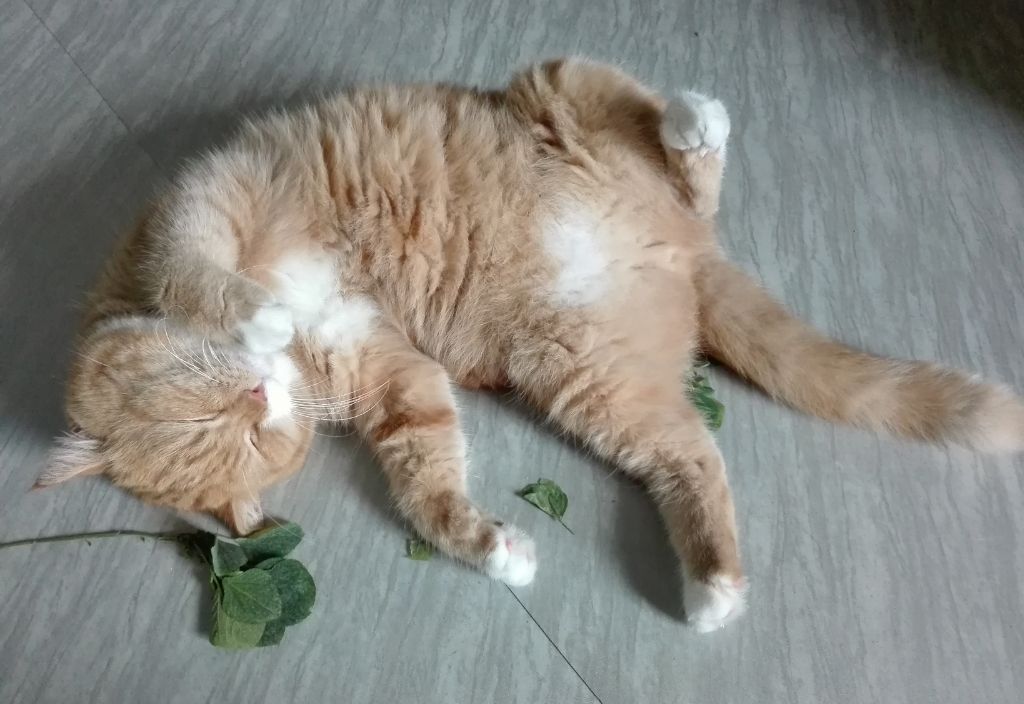bowel support for dogs


free shipping over $100 (USA & Canada)
1-877-937-4372 the pet expert hotline

Natural Help for Stress Reduction, Anxiety Relief, Behavioral Problems, and Aggression in Cats


Have you ever watched your cat do something and wondered why cats do that? Well, you’re not alone! Cats are mysterious creatures but animal experts continue to make discoveries for better understanding them. We’re here to explain some common cat behaviors that tend to make their humans wonder.
If you have ever seen your kitty rhythmically pressing their paws in and out on your lap, this behavior is called kneading or making biscuits. You may think they are attacking you with those razor-like claws, but what they are more likely saying is, “I trust you and I feel safe”. Researchers believe that this is a juvenile behavior that serves as a way for a kitten to communicate with their mama. They knead on her belly to stimulate milk production. Since being domesticated, many kitties retain this kitten-like behavior into adulthood and associate it with the same comfort they received from their mom. It is also possible that cats knead for more simple, relatable reasons, like stretching.
Purring may be how a cat keeps their muscles and bones healthy while napping.
Cats purr when they are content, in pain, giving birth, or even dying. Scientists speculate that purring may be a built-in physical therapy to keep their muscles, tendons, and bones healthy through sound! In the 1990s, Dr. Clinton Reuben of the state university in NY discovered that exposure to low-level frequencies in the range of cat purring helps build bone density and may promote healing. Bone density and muscle loss are serious issues for astronauts in zero gravity, so cat purring could be the answer to keeping the human body healthy in space! Many species of wildcats purr, including the cheetah. However, big cats like lions, tigers, jaguars, and leopards do not purr because of how their voice boxes are modified so they can roar.
Cats lick for a few different reasons. It could signal that they are not getting enough salt or hydration. Apart from raising a red flag healthwise, licking could be a leftover kitten behavior like kneading. Mama cats lick to groom and communicate affection simultaneously, so adult kitties only carry out this behavior with individuals they deem trustworthy. If your cat is excessively licking, it may be a sign of stress or anxiety.

From as young as one week old, kittens start meowing to get their mamas to take notice. Meowing is rarely heard in wild cat populations, except occasionally when mama cats are communicating with their kittens but they generally grow out of it when they get older. However, cats that live with humans, learn that meowing is a great way to get our attention so domestic kitties retain this kitten behavior with some even developing a “private language” of meows with their owners. Cat breeds that are notoriously chatty are the Siamese, the Oriental Shorthair, the Burmese, the Sphynx, and the Japanese Bobtail.
Scientists still don’t totally understand all of the underlying benefits of a good night’s sleep, whether in humans or animals, so it is hard to say why cats seem to be constantly in rest mode. Cats generally don’t sleep in one big chunk. They likely have many shorter rest periods throughout the day combined with intense bursts of energy. In terms of evolutionary biology, cats need a lot of sleep to conserve their energy for stalking, chasing, pouncing, climbing, and running while on the hunt. However, cats may also sleep out of boredom or mental health reasons. If your cat suddenly sleeps longer than usual, get in touch with your veterinarian. Senior kitties tend to sleep more than younger kitties.

Eating plants is a common behavior for cats. Scientists suspect that eating plants is instinctual. It may also come with an evolutionary benefit for kitty-kind, helping them expel internal parasites, hairballs and perhaps gain micronutrients. To allow your kitty to express this innate desire to eat plants, we recommend growing or buying nonpoisonous plants. If your cat throws up afterward, at least you can have peace of mind knowing it will be safe for them, and they aren’t doing it just to make a mess.
Men might grow facial hair to cultivate a specific look or style, but a cat’s whiskers have nothing to do with fashion! These stiff hairs function as sensory tools to help a cat detect an object’s location, size, and texture, even in the dark, and help them steer clear of approaching danger. Whiskers are especially useful for helping a cat know whether they can fit into a tight space and can even detect subtle shifts in air currents. Whiskers can also provide insight into how a cat is feeling. For example, pulled back or tight whiskers can indicate a tense kitty, while relaxed whiskers indicate a content kitty.
Not all cats hate water, some breeds like the Aegean Cat, Bengal, and Maine Coon love to swim and dip their paws in the water. Apart from those breeds, perhaps many kitties don’t like water because it is unfamiliar. They are meticulous groomers, so they are unlikely to be introduced to water early in life and are not used to being wet. As a pet parent, if you regularly expose your cat to water from an early age, they may be more accepting of it. Domesticated kitties are descendants of felines that typically live in the desert, so there was perhaps no evolutionary need to learn how to swim.

Some cats exhibit strange behavior when encountering catnip, much like a female cat in heat! They may rub up against or jump onto the herb, vocalize and drool. Recent studies suggest cats may rub against catnip for its insect repelling properties. Response to catnip is hereditary; it is controlled by a single gene that only about two-thirds of cats carry. Catnip does not affect kittens until they reach six months of age and begin to reach sexual maturity. Many cat species have this reaction to the herb, including lions, tigers, leopards, and lynxes. Even today, a cat’s response to catnip is a bit of a mystery, and we don’t fully understand it.
Cats enjoy well-protected snug spaces, especially when they intend to sleep. A cardboard box seems to fit the bill for many cats. Why some seem to prefer boxes that are too small for them is a bit of an enigma.
If there are any other burning questions about cats that we did not answer, feel free to start chatting with us by tapping the button below.
bowel support for dogs


Natural Support for Inflammatory Bowel Disease in Cats
buy 2 and save $3
3 month supply for a small to medium size pet.
If your kitty’s fur is looking dull, they won’t eat their favorite treats and are suffering from vomiting, weight loss, diarrhea, and lethargy, your sweet kitty may have Inflammatory Bowel Disease (IBD in cats). NHV TumFlora can help naturally balance the intestinal flora in your kitty’s body and help maintain a healthy gut. It’s also a great proactive gut supplement for a happy, healthy furbaby.


If your kitty’s fur is looking dull, they won’t eat their favorite treats and are suffering from vomiting, weight loss, diarrhea, and lethargy, your sweet kitty may have Inflammatory Bowel Disease (IBD in cats). NHV TumFlora can help naturally balance the intestinal flora in your kitty’s body and help maintain a healthy gut. It’s also a great proactive gut supplement for a happy, healthy furbaby.

Inflammatory Bowel Disease in cats (IBD) is a condition that mainly affects middle-aged to senior kitties, though it can occur at any age. IBD in cats is caused by an inflammatory response to an irritated and inflamed GI tract.
How TumFlora Supports Inflammatory Bowel Disease in Cats
The exact causes of IBD in cats are unknown, however, evidence does suggest that it may arise from an abnormal interaction between bacterial populations in the intestines, diet, a compromised immune system, and other environmental factors as well as genetic abnormalities. TumFlora helps support the body on a variety of levels, which helps address this complex problem.
To help address the imbalance of bacterial populations in the intestines, TumFlora’s blend of herbs work to improve natural intestinal flora. Herbs like licorice and ashwagandha offer support for the immune system, while vitamin and mineral dense herbs like slippery elm and oregon grape help improve nutrient absorption.
In addition to helping with IBD in cats, TumFlora can also help support your kitty if they are suffering from food allergies, gastrointestinal ulcers, and bacterial infections of the gut. Don’t wait for your kitty to have IBD for adding TumFlora, this gentle supplement can be used on a long term proactive basis to support your pet’s gut health.
Inflammatory response thickens the lining of the GI tract, which ends up affecting digestion, absorption of nutrients, and healthy bathroom habits. Cats with Irritable Bowel Disease can experience the following symptoms:
Symptoms of Inflammatory Bowel Disease in Cats
Your veterinarian may recommend treatment for intestinal parasites as well as a combination of medications and diet therapy as a first step. A novel protein, like rabbit or duck, may also be recommended. It takes time and your veterinarian may need to try several different therapies and medications. For a personalized veterinary nutrition plan for your little one, click here.
At NHV, we are a team of holistic veterinarians, pet experts and animal enthusiasts. Get in touch with us if you have any questions or concerns about your pup’s GI tract health or need some extra support.
Made with the finest, organically grown, or ethically harvested herbs. Made specifically for pets, vet-formulated, and vet approved.
Ashwagandha also known as Indian ginseng, is a root that contains a range of beneficial properties including anti-stress and anti-inflammatory action. It also helps defend against microorganisms and balances the immune system.
Boswellia has powerful anti-inflammatory properties and has been used in traditional herbal medicine to treat inflammatory bowel disease.
Chamomile has traditionally been used to help relieve indigestion, expel gas, ease nervous spasms, improve bile flow, and relieve vomiting due to inflammatory bowel disease in cats.
Fennel is an anti-inflammatory, nutritive herb that helps against microorganisms and soothes digestive upset, expels intestinal gas, and relaxes stomach cramps or spasms.
Indian Gooseberry is prized in Ayurvedic medicine for its many health benefits. It may help regulate cholesterol levels, and soothe nausea.
Licorice has been used for centuries for its immunostimulant and anti-inflammatory properties to support against microorganisms, digestion and general well-being. It contains free radical scavengers to help promote healing.
Marshmallow contains demulcent, and diuretic properties. It helps defend against microorganisms, controls bacterial infection, protects the intestinal mucosa, and soothes inflamed mucosa. It has been used in herbalism as a treatment for gastroenteritis.
Oregon Grape contains anti-inflammatory, anti-bacterial, and anti-fungal properties with strong affinities to the liver, digestive system, and mucous membranes.
Slippery Elm contains anti-inflammatory properties and is rich in vitamins and minerals. It is beneficial for gastritis, colitis, duodenal ulcers, and diarrhea.
Select your pet's weight to determine the correct dose.
To be taken twice daily. Determine your pet’s weight and then use the easy chart below to determine the correct dose. This is the minimum dosage.
Pet's Weight Dosage
0 - 15 lb = 0.5 ml
16 - 30 lb = 1.0 ml
31 - 45 lb = 1.5 ml
46 - 60 lb = 2.0 ml
61 - 75 lb = 2.5 ml
Over 75 lb = 3.0 ml
How to Administer
Shake well before use. The easiest method is to use the dropper provide and places the drops into your pet’s food or favorite treat. You can also use the dropper and squirt directly into the pet’s mouth.
Some pets can be finicky, if this occurs consider hiding the drops in foods most pet’s love such as fish, chicken or yogurt or a favorite treat. If your pet only eats dry food then soak a few kibbles at feeding time.
For Best Results
Herbal dietary supplements are beneficial to the health and wellbeing of your pet and are safe for long-term use. Every pet responds to natural herbal supplements differently, therefore it is important to be consistent and administer the product daily. Supplements generally take two to four weeks to take effect, however this will vary from one animal to the next.
Product Storage
All NHV Natural Pet Products are pure herbal extracts and contain no artificial additives, preservatives or coloring. Shelf life after opening is 6 months and must be refrigerated after opening.
Cautions and Contraindications: Do not use TumFlora in pregnant or nursing animals. Speak to your vet before using our products. A second visit is recommended if your pet’s condition does not improve, or deteriorates after continued use of the supplements.
Inflammatory Bowel Disease in cats (IBD) is a condition that mainly affects middle-aged to senior kitties, though it can occur at any age. IBD in cats is caused by an inflammatory response to an irritated and inflamed GI tract.
How TumFlora Supports Inflammatory Bowel Disease in Cats
The exact causes of IBD in cats are unknown, however, evidence does suggest that it may arise from an abnormal interaction between bacterial populations in the intestines, diet, a compromised immune system, and other environmental factors as well as genetic abnormalities. TumFlora helps support the body on a variety of levels, which helps address this complex problem.
To help address the imbalance of bacterial populations in the intestines, TumFlora’s blend of herbs work to improve natural intestinal flora. Herbs like licorice and ashwagandha offer support for the immune system, while vitamin and mineral dense herbs like slippery elm and oregon grape help improve nutrient absorption.
In addition to helping with IBD in cats, TumFlora can also help support your kitty if they are suffering from food allergies, gastrointestinal ulcers, and bacterial infections of the gut. Don’t wait for your kitty to have IBD for adding TumFlora, this gentle supplement can be used on a long term proactive basis to support your pet’s gut health.
Inflammatory response thickens the lining of the GI tract, which ends up affecting digestion, absorption of nutrients, and healthy bathroom habits. Cats with Irritable Bowel Disease can experience the following symptoms:
Symptoms of Inflammatory Bowel Disease in Cats
Your veterinarian may recommend treatment for intestinal parasites as well as a combination of medications and diet therapy as a first step. A novel protein, like rabbit or duck, may also be recommended. It takes time and your veterinarian may need to try several different therapies and medications. For a personalized veterinary nutrition plan for your little one, click here.
At NHV, we are a team of holistic veterinarians, pet experts and animal enthusiasts. Get in touch with us if you have any questions or concerns about your pup’s GI tract health or need some extra support.
Made with the finest, organically grown, or ethically harvested herbs. Made specifically for pets, vet-formulated, and vet approved.
Ashwagandha also known as Indian ginseng, is a root that contains a range of beneficial properties including anti-stress and anti-inflammatory action. It also helps defend against microorganisms and balances the immune system.
Boswellia has powerful anti-inflammatory properties and has been used in traditional herbal medicine to treat inflammatory bowel disease.
Chamomile has traditionally been used to help relieve indigestion, expel gas, ease nervous spasms, improve bile flow, and relieve vomiting due to inflammatory bowel disease in cats.
Fennel is an anti-inflammatory, nutritive herb that helps against microorganisms and soothes digestive upset, expels intestinal gas, and relaxes stomach cramps or spasms.
Indian Gooseberry is prized in Ayurvedic medicine for its many health benefits. It may help regulate cholesterol levels, and soothe nausea.
Licorice has been used for centuries for its immunostimulant and anti-inflammatory properties to support against microorganisms, digestion and general well-being. It contains free radical scavengers to help promote healing.
Marshmallow contains demulcent, and diuretic properties. It helps defend against microorganisms, controls bacterial infection, protects the intestinal mucosa, and soothes inflamed mucosa. It has been used in herbalism as a treatment for gastroenteritis.
Oregon Grape contains anti-inflammatory, anti-bacterial, and anti-fungal properties with strong affinities to the liver, digestive system, and mucous membranes.
Slippery Elm contains anti-inflammatory properties and is rich in vitamins and minerals. It is beneficial for gastritis, colitis, duodenal ulcers, and diarrhea.
Select your pet's weight to determine the correct dose.
To be taken twice daily. Determine your pet’s weight and then use the easy chart below to determine the correct dose. This is the minimum dosage.
Pet's Weight Dosage
0 - 15 lb = 0.5 ml
16 - 30 lb = 1.0 ml
31 - 45 lb = 1.5 ml
46 - 60 lb = 2.0 ml
61 - 75 lb = 2.5 ml
Over 75 lb = 3.0 ml
How to Administer
Shake well before use. The easiest method is to use the dropper provide and places the drops into your pet’s food or favorite treat. You can also use the dropper and squirt directly into the pet’s mouth.
Some pets can be finicky, if this occurs consider hiding the drops in foods most pet’s love such as fish, chicken or yogurt or a favorite treat. If your pet only eats dry food then soak a few kibbles at feeding time.
For Best Results
Herbal dietary supplements are beneficial to the health and wellbeing of your pet and are safe for long-term use. Every pet responds to natural herbal supplements differently, therefore it is important to be consistent and administer the product daily. Supplements generally take two to four weeks to take effect, however this will vary from one animal to the next.
Product Storage
All NHV Natural Pet Products are pure herbal extracts and contain no artificial additives, preservatives or coloring. Shelf life after opening is 6 months and must be refrigerated after opening.
Cautions and Contraindications: Do not use TumFlora in pregnant or nursing animals. Speak to your vet before using our products. A second visit is recommended if your pet’s condition does not improve, or deteriorates after continued use of the supplements.
hairball support

Natural Support for Hairballs and Digestive Health
bundle and save with pet expert kits
3 month supply for a small to medium size pet.
If your sweet fur baby is throwing up hairballs, there may be more going on than you may think. Left untreated, hairballs can affect other organs like the liver and kidneys. Give your little one the full support they need with NHV’s Hairball control kit.


If your sweet fur baby is throwing up hairballs, there may be more going on than you may think. Left untreated, hairballs can affect other organs like the liver and kidneys. Give your little one the full support they need with NHV’s Hairball control kit.

Did you know that your furkiddo spends 30% of their waking life grooming? And because of their natural habit, they tend to swallow a lot of hair! Long haired cat breeds like Main Coons, Persians, and Ragdolls are more likely to develop hairballs than their short-haired meow-sins; however, all cats can get them. If the ingested hair cannot get past your kitty's stomach and small intestine, then a hairball will form. NHV Hairball Control Kit contains Hairb-Ez, which helps to dissolve hair buildup, soothe inflammation along the GI tract and improve the motility of undigested matter, while Milk Thistle helps with detoxification, reducing oxidative stress on the liver, and supporting healthy kidney/gallbladder function.
The hacking sound of your kitty retching is pretty unpleasant to witness for any pet parent, but hairballs are a side effect of your cat's constant grooming. Suppose your furry friend is throwing up a hairball more than once a month. In that case, there may be something more serious going on like intestinal motility problems, skin issues, abdomen issues, urinary tract problems, or musculoskeletal concerns. When your kitty is grooming, their tongue is barbed (like a miniature brush), moving loose hair down their throat. Typically, this ingested hair passes through their GI tract and into their litter box. Sometimes, however, the hair can get stuck in their stomach, and they throw this up as hairballs. Hairballs become a problem when your kitty's digestive system can't move the hair through the stomach and intestinal tract at an average speed, leading to a possible blockage and issues with other organs. NHV Hairball Control Kit contains Hairb-Ez and Milk Thistle to help support your kitty's digestive health, organ health and to help pass hairballs naturally.
Hairball Control Kit is a natural healthcare support that aids with dissolving hairballs, improving GI tract health as well as support detoxification and immune function. These liquid supplements with high bioavailability are safe and effective to use alongside other hairball treatments.
At NHV, we are a team of pet experts, vets, and animal lovers. Get in touch with us if you have any questions or concerns about your kitty's unique health concerns.
Made with the finest, organically grown, or ethically harvested herbs. Made specifically for pets, vet-formulated and vet approved.
Hairb-Ez
Milk Thistle
Select your pet's weight to determine the correct dose.
To be taken twice daily. Determine your pet’s weight and then use the easy chart below to determine the correct dose. This is the minimum dosage.
Pet's Weight Dosage
0 - 15 lb = 0.5 ml
16 - 30 lb = 1.0 ml
31 - 45 lb = 1.5 ml
46 - 60 lb = 2.0 ml
61 - 75 lb = 2.5 ml
Over 75 lb = 3.0 ml
For rabbits: 0.5 ml twice a day
How to Administer
Shake well before use. The easiest method is to use the dropper provided and place the drops into your pet’s food or favorite treat. You can also use the dropper and squirt directly into the pet’s mouth. Some pets can be finicky, if this occurs consider hiding the drops in foods most pet’s love such as fish, chicken or yogurt or a favorite treat. If your pet only eats dry food then soak a few kibbles at feeding time.
For Best Results
Herbal dietary supplements are beneficial to the health and well-being of your pet and are safe for long-term use. Every pet responds to natural herbal supplements differently, therefore it is important to be consistent and administer the product daily. Supplements generally take two to four weeks to take effect, however this will vary from one animal to the next.
Product Storage
All NHV Natural Pet Products are pure herbal extracts and contain no artificial additives, preservatives or coloring. Shelf life after opening is 6 months and must be refrigerated after opening.
Cautions and Contraindications
Do not use in pregnant or nursing animals.
All information provided by NHV Natural Pet Products is for educational purposes only.
Did you know that your furkiddo spends 30% of their waking life grooming? And because of their natural habit, they tend to swallow a lot of hair! Long haired cat breeds like Main Coons, Persians, and Ragdolls are more likely to develop hairballs than their short-haired meow-sins; however, all cats can get them. If the ingested hair cannot get past your kitty's stomach and small intestine, then a hairball will form. NHV Hairball Control Kit contains Hairb-Ez, which helps to dissolve hair buildup, soothe inflammation along the GI tract and improve the motility of undigested matter, while Milk Thistle helps with detoxification, reducing oxidative stress on the liver, and supporting healthy kidney/gallbladder function.
The hacking sound of your kitty retching is pretty unpleasant to witness for any pet parent, but hairballs are a side effect of your cat's constant grooming. Suppose your furry friend is throwing up a hairball more than once a month. In that case, there may be something more serious going on like intestinal motility problems, skin issues, abdomen issues, urinary tract problems, or musculoskeletal concerns. When your kitty is grooming, their tongue is barbed (like a miniature brush), moving loose hair down their throat. Typically, this ingested hair passes through their GI tract and into their litter box. Sometimes, however, the hair can get stuck in their stomach, and they throw this up as hairballs. Hairballs become a problem when your kitty's digestive system can't move the hair through the stomach and intestinal tract at an average speed, leading to a possible blockage and issues with other organs. NHV Hairball Control Kit contains Hairb-Ez and Milk Thistle to help support your kitty's digestive health, organ health and to help pass hairballs naturally.
Hairball Control Kit is a natural healthcare support that aids with dissolving hairballs, improving GI tract health as well as support detoxification and immune function. These liquid supplements with high bioavailability are safe and effective to use alongside other hairball treatments.
At NHV, we are a team of pet experts, vets, and animal lovers. Get in touch with us if you have any questions or concerns about your kitty's unique health concerns.
Made with the finest, organically grown, or ethically harvested herbs. Made specifically for pets, vet-formulated and vet approved.
Hairb-Ez
Milk Thistle
Select your pet's weight to determine the correct dose.
To be taken twice daily. Determine your pet’s weight and then use the easy chart below to determine the correct dose. This is the minimum dosage.
Pet's Weight Dosage
0 - 15 lb = 0.5 ml
16 - 30 lb = 1.0 ml
31 - 45 lb = 1.5 ml
46 - 60 lb = 2.0 ml
61 - 75 lb = 2.5 ml
Over 75 lb = 3.0 ml
For rabbits: 0.5 ml twice a day
How to Administer
Shake well before use. The easiest method is to use the dropper provided and place the drops into your pet’s food or favorite treat. You can also use the dropper and squirt directly into the pet’s mouth. Some pets can be finicky, if this occurs consider hiding the drops in foods most pet’s love such as fish, chicken or yogurt or a favorite treat. If your pet only eats dry food then soak a few kibbles at feeding time.
For Best Results
Herbal dietary supplements are beneficial to the health and well-being of your pet and are safe for long-term use. Every pet responds to natural herbal supplements differently, therefore it is important to be consistent and administer the product daily. Supplements generally take two to four weeks to take effect, however this will vary from one animal to the next.
Product Storage
All NHV Natural Pet Products are pure herbal extracts and contain no artificial additives, preservatives or coloring. Shelf life after opening is 6 months and must be refrigerated after opening.
Cautions and Contraindications
Do not use in pregnant or nursing animals.
All information provided by NHV Natural Pet Products is for educational purposes only.
multivitamin support

Herbal Digestive Aid, Energy Booster, and Multivitamin for Cats
buy 2 and save $3
3 month supply for a small to medium size pet
These multivitamins for cats will ensure your kitty (of any age) is getting an extra dose of minerals and vitamins for extra energy, vitality, and health.


These multivitamins for cats will ensure your kitty (of any age) is getting an extra dose of minerals and vitamins for extra energy, vitality, and health.

The health benefits of multivitamins aren’t just for humans. Cats have many of the same nutrient needs as we do, and some need even more than others depending on their age and health.
A multivitamin supplies the vital nutrients your kitty needs to be healthy and to fight off potential health problems. Dr. Cook, DVM, CVA in her blog states that vitamins “help to regulate the body processes, protect the body from environmental toxins, and break down nutrients such as carbohydrates, proteins, and fats so the body can utilize them”.
The best way to give your cat vitamins and minerals are from whole food sources and not just isolated synthetic vitamins. NHV Multi Essentials contains a powerful blend of alfalfa, oat, dandelion, kelp, parsley, marshmallow, chickweed, stinging nettle, Asian ginseng, yucca and Oregon grape.
Health Benefits of NHV’s Multi-Essentials for Cats
With NHV’s multi vitamins for cats, you get a proprietary blend of all-natural ingredients that are organically grown and contain no artificial additives, preservatives, or coloring. Some of the health benefits include:
Multivitamins for cats will ensure your kitty is getting the proper nutrients that could be lacking due to daily stressors, a poor diet, and environmental toxins.
Signs of Vitamin Deficiency in Your Cat
Kitties Who’ve Benefited from NHV Multi Essentials
NHV multi vitamin for cats has helped thousands of pets around the world. Here are just a few of their stories:
DEALING WITH DIGESTIVE ISSUES: MICI THE CAT LOVES HIS VITAMINS NHV MULTI ESSENTIALS
HERBAL MULTIVITAMINS AND TURMERIC HELP CATS, OATMEAL AND MELISSA LIVE HAPPIER
CAN CATS WITH FELV LIVE A HEALTHY AND NORMAL LIFE?
If you have questions regarding holistic support including vitamin supplements for cats, ask an NHV expert because, at NHV, we want your cat to feel clawtastic naturally!
Select your pet's weight to determine the correct dose.
To be taken twice daily. Determine your pet’s weight and then use the easy chart below to determine the correct dose. This is the minimum dosage.
Pet's Weight Dosage
0 - 15 lb = 0.5 ml
16 - 30 lb = 1.0 ml
31 - 45 lb = 1.5 ml
46 - 60 lb = 2.0 ml
61 - 75 lb = 2.5 ml
Over 75 lb = 3.0 ml
How to Administer
Shake well before use. The easiest method is to use the dropper provide and places the drops into your pet’s food or favorite treat. You can also use the dropper and squirt directly into the pet’s mouth.
Some pets can be finicky, if this occurs consider hiding the drops in foods most pet’s love such as fish, chicken or yogurt or a favorite treat. If your pet only eats dry food then soak a few kibbles at feeding time.
For Best Results
Herbal dietary supplements are beneficial to the health and wellbeing of your pet and are safe for long-term use. Every pet responds to natural herbal supplements differently, therefore it is important to be consistent and administer the product daily. Supplements generally take two to four weeks to take effect, however this will vary from one animal to the next.
Product Storage
All NHV Natural Pet Products are pure herbal extracts and contain no artificial additives, preservatives or coloring. Shelf life after opening is 6 months and must be refrigerated after opening.
Cautions and Contraindications
Do not use Multi Essentials in pregnant or nursing animals. Speak to your vet before using our products. A second visit is recommended if your pet’s condition does not improve, or deteriorates after continued use of the supplements.
All information provided by NHV Natural Pet Products is for educational purposes only.
The health benefits of multivitamins aren’t just for humans. Cats have many of the same nutrient needs as we do, and some need even more than others depending on their age and health.
A multivitamin supplies the vital nutrients your kitty needs to be healthy and to fight off potential health problems. Dr. Cook, DVM, CVA in her blog states that vitamins “help to regulate the body processes, protect the body from environmental toxins, and break down nutrients such as carbohydrates, proteins, and fats so the body can utilize them”.
The best way to give your cat vitamins and minerals are from whole food sources and not just isolated synthetic vitamins. NHV Multi Essentials contains a powerful blend of alfalfa, oat, dandelion, kelp, parsley, marshmallow, chickweed, stinging nettle, Asian ginseng, yucca and Oregon grape.
Health Benefits of NHV’s Multi-Essentials for Cats
With NHV’s multi vitamins for cats, you get a proprietary blend of all-natural ingredients that are organically grown and contain no artificial additives, preservatives, or coloring. Some of the health benefits include:
Multivitamins for cats will ensure your kitty is getting the proper nutrients that could be lacking due to daily stressors, a poor diet, and environmental toxins.
Signs of Vitamin Deficiency in Your Cat
Kitties Who’ve Benefited from NHV Multi Essentials
NHV multi vitamin for cats has helped thousands of pets around the world. Here are just a few of their stories:
DEALING WITH DIGESTIVE ISSUES: MICI THE CAT LOVES HIS VITAMINS NHV MULTI ESSENTIALS
HERBAL MULTIVITAMINS AND TURMERIC HELP CATS, OATMEAL AND MELISSA LIVE HAPPIER
CAN CATS WITH FELV LIVE A HEALTHY AND NORMAL LIFE?
If you have questions regarding holistic support including vitamin supplements for cats, ask an NHV expert because, at NHV, we want your cat to feel clawtastic naturally!
Select your pet's weight to determine the correct dose.
To be taken twice daily. Determine your pet’s weight and then use the easy chart below to determine the correct dose. This is the minimum dosage.
Pet's Weight Dosage
0 - 15 lb = 0.5 ml
16 - 30 lb = 1.0 ml
31 - 45 lb = 1.5 ml
46 - 60 lb = 2.0 ml
61 - 75 lb = 2.5 ml
Over 75 lb = 3.0 ml
How to Administer
Shake well before use. The easiest method is to use the dropper provide and places the drops into your pet’s food or favorite treat. You can also use the dropper and squirt directly into the pet’s mouth.
Some pets can be finicky, if this occurs consider hiding the drops in foods most pet’s love such as fish, chicken or yogurt or a favorite treat. If your pet only eats dry food then soak a few kibbles at feeding time.
For Best Results
Herbal dietary supplements are beneficial to the health and wellbeing of your pet and are safe for long-term use. Every pet responds to natural herbal supplements differently, therefore it is important to be consistent and administer the product daily. Supplements generally take two to four weeks to take effect, however this will vary from one animal to the next.
Product Storage
All NHV Natural Pet Products are pure herbal extracts and contain no artificial additives, preservatives or coloring. Shelf life after opening is 6 months and must be refrigerated after opening.
Cautions and Contraindications
Do not use Multi Essentials in pregnant or nursing animals. Speak to your vet before using our products. A second visit is recommended if your pet’s condition does not improve, or deteriorates after continued use of the supplements.
All information provided by NHV Natural Pet Products is for educational purposes only.
Published: March 23, 2022